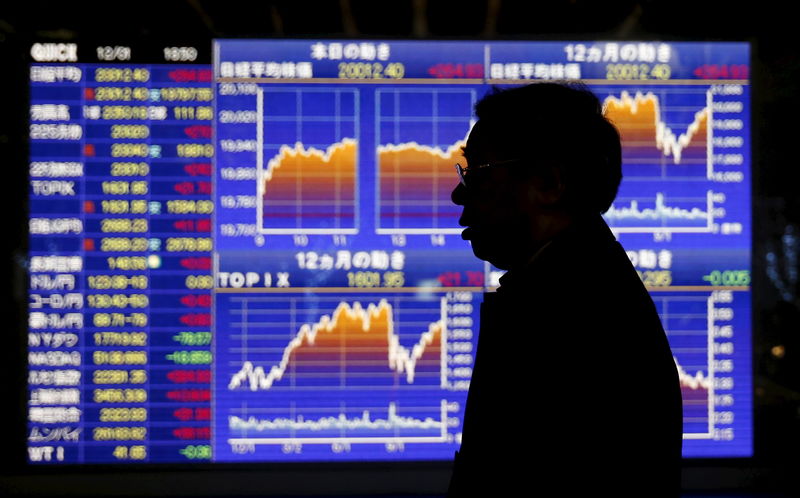By Nichola Saminather and Lisa Twaronite
SINGAPORE/TOKYO (Reuters) - Asian shares took their cue from Wall Street and slipped on Friday, and Japanese stocks returned to negative territory after briefly jumping on the central bank's statement that it would expand parts of its stimulus program.
MSCI's broadest index of Asia-Pacific shares outside Japan (MIAPJ0000PUS) was down 0.3 percent. It was still up 1.7 percent for a week that has featured first U.S. interest rate hike in nearly a decade and a depreciating yuan.
Japan's Nikkei (N225) rose briefly but fell back to be down 0.4 percent, and looked set to end the week flat.
The Bank of Japan maintained its base money target under its massive stimulus program on Friday but set up a new program to buy exchange-traded funds, extend the maturity of bonds it owns to around 12 years, and increase its purchases of risky assets.
The divergence between U.S. and other countries' monetary policies was also seen in Taiwan, with the central bank unexpectedly cutting interest rates for the second time this year on Thursday. The island's bank also said it would keep monetary policy loose to shore up growth in the trade-dependent economy as the global demand outlook worsened.
Taiwan stocks (TWII) slipped 0.4 percent, shrinking gains for the week to 2.2 percent. The Taiwan dollar strengthened to T$32.935 versus its previous close of T$33.035 after the central bank said it would maintain an orderly foreign exchange market.
"The global macro dynamics from the beginning of a Fed rate hiking cycle are slowly playing out across the world," Angus Nicholson, market analyst at IG in Melbourne, said in a note to clients.
"In the direct wake of the decision we have seen some dramatic moves in central bank policy with Taiwan cutting its benchmark interest rate, Hong Kong and Mexico both hiking rates, and Argentina removing currency controls and devaluing the peso by 30 percent."
The U.S. dollar slipped about 0.3 percent against the Japanese currency to 122.25 yen <JPY=>, and was up over 1.1 percent for the week.
Non-deliverable forwards are pricing in further declines for most emerging market currencies, which dropped after the Fed's decision to hike rates.
One-year non-deliverable forwards show currencies including the Indonesian rupiah <IDR=>, Indian rupee <INR=>, the Malaysian ringgit <MYR=> and the Thai baht <THB=> weakening.
The dollar index (DXY), which tracks the greenback against a basket of six rivals, edged down about 0.4 percent to 99.892, after jumping 1.2 percent on Thursday, its biggest rise in over a month. It's up about 1.4 percent for the week.
China's yuan strengthened on Friday after 10 straight sessions of weakness against the dollar through Thursday, the longest such streak on record, after the central bank guided the Chinese currency lower.
The People's Bank of China set Friday's midpoint rate <CNY=SAEC> at 6.4814 per dollar prior to market open, compared with the previous fix of 6.4757. The spot market <CNY=CFXS> opened at 6.4870 per dollar, and was changing hands at 6.4830 at 0425 GMT (11.25 p.m. ET Thursday), up from the previous close of 6.4837.
The euro was up about 0.2 percent at $1.0847 <EUR=>, but down about 1.3 percent for the week.
Wall Street drooped on Thursday as crude oil futures continued to wallow at multi-year lows against a backdrop of oversupply as well as a stronger dollar following the U.S. Federal Reserve's widely anticipated tightening on Wednesday.
U.S. crude futures (CLc1) continued to slip in Asian trading, down 0.6 percent at $34.73 a barrel.
Brent (LCOc1) ended trade on Thursday less than $1 above its 2004 low of $36.40. It recovered on Friday, rising 0.1 percent to $37.09.
Gold edged up slightly from Thursday, when it suffered its biggest slide in five months after the Fed's rate hike.

Spot gold <XAU=> rose 0.2 percent, after tumbling 2 percent on Thursday, and is down 1.9 percent for the week in its worst weekly performance in six weeks.